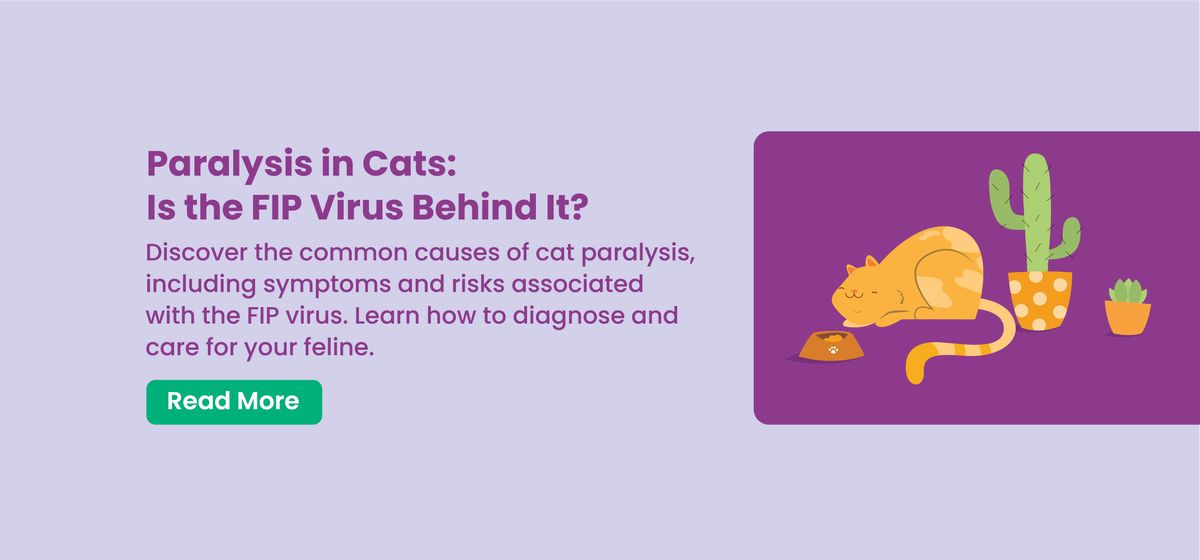
Every pet owner undoubtedly feels anxious when they see their pet struggling to move or even being completely immobile. One medical condition causing this in cats is paralysis. Paralysis in cats is when a cat loses its ability to move some or all parts of its body.
To determine the cause of the paralysis, various diagnostic tests are needed, including physical examinations and blood tests. The prognosis can range from quite optimistic to poor, depending on the root diagnosis.
What is Paralysis in Cats?
Paralysis is the loss of movement in part or all of the body, which can be temporary or permanent. It typically happens due to issues with the nervous system or muscles. Paralysis can be temporary or permanent, total or partial, and can affect one leg, both legs on the same side, or the entire body.
Causes of Paralysis in Cats
Paralysis usually results from problems with the motor nerves, responsible for sending signals from the brain to the muscles to initiate movement. These issues can arise from direct nerve damage, damage to nerve pathways in the brain or spinal cord, or problems with the muscles themselves.
Many factors can cause paralysis in cats, including:
Injury:
A common cause of cat paralysis is injury from accidents like falls from heights or being hit by a vehicle. This can lead to nerve or spinal cord damage.
Infection or Inflammation:
Another cause of cat paralysis is infections in the brain, spinal cord, or nerves.
FIP Virus Infection:
In cases of cats with FIP, if not addressed promptly, the FIP virus can attack the nervous system, leading to symptoms like loss of balance, limping, and the cat being unable to stand or walk. This can be categorized as neural-type FIP. If untreated, it can cause permanent nerve damage.
Symptoms of Cat Paralysis:
While symptoms of paralysis can vary, common ones include:
Inability to move or walk
Difficulty standing up
Weak or stiff movement
Pain
Difficulty in urination
Paralysis is one of the symptoms experienced by cats with the FIP virus. Typically, besides paralysis, cats might also exhibit:
Fever
Significant weight loss
Breathing problems
Ocular symptoms
Jaundice
Anemia
Urinary tract issues
If any of these symptoms appear, you should contact your veterinarian for proper treatment.
Diagnosis and Examination:
Veterinarians will use various methods to diagnose the cause of paralysis, including:
Physical examination
X-rays
MRI or CT scans
Blood tests
If a cat has long-term paralysis with unknown causes, it might be due to viral infections like the FIP virus in cats.
To improve diagnosis, tests like the FCOV AB Test, Rivalta test (if fluid buildup is present), and hematological and chemical blood tests might be required.
How to Treat Cat Paralysis from the FIP Virus:
When facing paralysis in a cat, the owner needs to know the proper and effective treatment. If a cat is infected with the FIP virus, consult with a doctor to obtain GS-441524 from Basmi FIP, an effective treatment for cat FIP. GS-441524 is an antiviral developed by Dr. Niels Pedersen in research to cure all types of FIP in cats, including neural-type FIP marked by paralysis. This medicine has been clinically tested and is proven highly effective in treating cats with FIP. Treatment efficacy with GS-441524 reaches over 87%, providing new hope for cat owners battling the FIP disease.
In some neural-type FIP cases, additional therapy besides medication are recommended:
Physiotherapy: Special exercises to strengthen muscles, enhance movement function, and promote healing.
Acupuncture: Can help alleviate pain and restore some functions.
While not all paralysis cases can be prevented, taking preventive measures like ensuring cats don't fall or get hit by vehicles, and routined vaccinations and parasite treatments can help the cat lead a healthy life.
FIP is a serious disease, but early detection can help improve the chances of a positive outcome. If your cat is showing symptoms of FIP, take them to your nearest veterinarian for proper diagnosis and treatment. If you have any questions or concerns about FIP and its treatment, don't hesitate to contact us on WhatsApp or visit our Instagram for more information.



